The 2019 Community Read: Birdwatching

While it seems as though our society is constantly running at full speed, the State College community recently had the opportunity to take a few moments to appreciate the beauty in the natural world around us by engaging with the chosen text for the 2019 Centre County Reads program. Penn State alumna Katie Fallon’s Vulture: The Private Life of an Unloved Bird combines striking landscape descriptions with personal reflection and creative imagination in order to trace turkey vulture migration far beyond her home in the Appalachian region. Centre County Reads, coordinated each year by CALS, Schlow Centre Region Library, and the Centre County Library and Historical Museum, provided a unique opportunity for the Centre County community to come together to appreciate these vultures, who are diligent reminders of nature’s complexity and a different type of neighbor.
CCR kicked off this year with one showing of the film Winged Migration at Schlow Library on January 29 and another at Centre County Library and Historical Society in Bellefonte on February 1. This 2001 documentary film features one of the most extensive compilations of avian migration footage to date and follows several bird species through an entire migration cycle, highlighting the sheer effort the birds must exert in order to successfully complete their arduous journeys. Danger lurks for the birds at every turn, however: from predators to severe weather conditions to human interference, surviving the journey of sometimes thousands of miles is only the first challenge of their great endeavor.
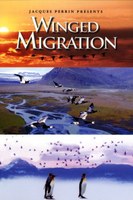
- Winged Migration (2001) movie poster
Having learned about the dangers and complexity of bird migration, community members ventured to Millbrook Marsh Nature Center to view the turkey vulture’s environment firsthand on February 23. On this cold, rainy February day, the group maneuvered through the snow-covered trail, admiring the elegance in what is usually seen to be a drab, gray time of the year. Several birds made an appearance despite the weather, including downy woodpeckers, cardinals, and even a Cooper’s hawk, who circled above the group all afternoon. Just as Fallon encourages Vulture’s readers to do – and as she herself does – the humans who braved the Winter Bird Walk were able to take a moment to recognize and learn more about their fowl neighbors while also enjoying and sharing space.
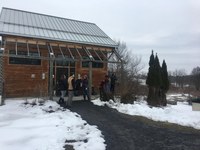
- Visitors of all ages prepare for the CCR Winter Bird Walk, held at Millbrook Marsh Nature Center in February
These reflections turned to formal discussion at “The Changing Nature of Nature Writing” roundtable discussion hosted by CALS on March 12 in the Pattee/Paterno Library. Each of the three panelists brought their own expertise to the topic, engaging with Fallon’s novel in order to explore the connections between society’s relationships to literature and the natural world. McKay Jenkins, Cornelius Tilghman Professor of English, Journalism and Environmental Humanities at the University of Delaware, spoke about the changing landscape of what is now rural and suburban America, and described the ways that English students in colleges and universities can use writing to reconnect both themselves and their communities with the environment around them. Liz Hajek, Penn State Associate Professor of Geosciences, spoke about the history of Earth from a scale exceeding human existence, using timelines of Earth’s history to mark the scale of environmental destruction caused by humans and illuminate the context of society’s relationship to the environment. Finally, Talley Kayser, director of the Adventure Literature program in the Penn State English department, spoke directly about Fallon’s book, making the connection between complex literary topics and the anthropocene, the current geological epoch. She did so by appreciating the “humanness” of the vultures throughout the novel, especially within the poetic narratives between chapters that follow the migration of one female vulture. The academic variety of the panel and the audience’s interest in the afternoon’s topic led to an engaging Q&A session after the presentations, during which the panelists themselves enjoyed a productive and cordial conversation which circled around how literature can help explore the intersections of modern society and the natural world.
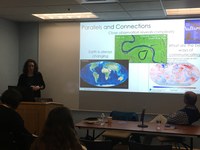
- Liz Hajek connects the form that human-environment relationships take with developments in Earth's stratigraphy as McKay Jenkins looks on
The outdoor programing continued with the Meet the Creek event at the newly reopened Shaver’s Creek Environmental Center on March 31. With the snow finally melted and the spring warmth in sight, community members and their families enjoyed a presentation on vultures that echoed much of the research presented in Vulture, including details of the bird’s migration patterns, each vulture’s relationship to other species of vultures, and some of the dangers they face because of human activity, such as the possibility of lead poisoning brought on by feeding on animals shot with lead bullets. After the the indoor presentation concluded, the group moved outside to the raptor center – a new Shaver’s Creek feature, partly inspired by the message of Fallon’s book – to meet Neo, the resident turkey vulture. Since vultures are scavengers, they are excellent problem-solvers, and Neo demonstrated this by listening to the handler’s commands and moving from one perch to another in his enclosure. Neo was also given a toy to show off his skills, and pulled crumpled newspaper from cut-outs in a cardboard box to fish out the treats tucked within.
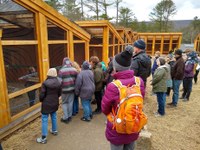
- Spectators gather to get up close and personal with Neo the turkey vulture at Shaver's Creek's new raptor enclosures
This year’s series concluded in the Assembly Room of the Nittany Lion Inn on April 4 with “An Evening with Katie Fallon.” The event was jointly sponsored by the Penn State creative writing program and CCR and served as the culminating event for CCR and the Penn State English Department’s Mary E. Rolling Reading Series. Before Julia Spicher Kasdorf, Penn State Professor of English and Women's, Gender, and Sexuality Studies, sat down with Katie Fallon for an interview and reading, CALS celebrated the winners of this year’s writing contest, which was centered on the theme Writing the Nonhuman. Inspired by Fallon’s own creativity, the contest asked writers to construct a creative writing entry from the perspective of the nonhuman. Winners were selected from a series of outstanding submissions in under 18, poetry, fiction, and nonfiction categories, which can be viewed here. As the evening progressed, more than 170 attendees listened attentively as Fallon read passages from Vulture, paying particular attention to the poetic entries written from the perspective of a female vulture. The Q & A that followed brought questions – many of which were preceded by stories of the audience’s own experiences with vultures and other scavengers – about the birds’ habits, group dynamics, and importance to other cultures outside of the United States. Fallon spoke about her hometown region of Northeastern Pennsylvania, an area many of the attendees were familiar with, and touched upon the research that went into writing the book as well as her experiences tracing the migratory patterns of the birds with tagging and wireless tracking devices. At the conclusion of the event, audience members lined up to speak with Katie and get their copies of Vulture signed, all the while continuing to share stories about their encounters with turkey vultures both in the State College area and beyond.
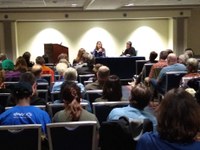
- Vulture author Katie Fallon reads selections from her book as Julia Kasdorf listens in
As the attendees exited the Nittany Lion Inn into the fresh spring air, another successful Centre County Reads came to a close. Appreciative of a series filled with fascinating informational events and exploration of local nature, the State College community concluded a journey of their own, pondering both what it means to be a part of a societal community and a natural, environmental one. As the natural cycle continues, the cold weather will return, as will Centre County Reads. Until then, the turkey vultures will still be here, observed now by more admiring and informed neighbors than ever before.
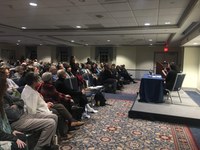
- 170 Centre County residents gather at the Nittany Lion Inn in April, 2019, to hear Katie Fallon read from Vulture

While it seems as though our society is constantly running at full speed, the State College community recently had the opportunity to take a few moments to appreciate the beauty in the natural world around us by engaging with the chosen text for the 2019 Centre County Reads program. Penn State alumna Katie Fallon’s Vulture: The Private Life of an Unloved Bird combines striking landscape descriptions with personal reflection and creative imagination in order to trace turkey vulture migration far beyond her home in the Appalachian region. Centre County Reads, coordinated each year by CALS, Schlow Centre Region Library, and the Centre County Library and Historical Museum, provided a unique opportunity for the Centre County community to come together to appreciate these vultures, who are diligent reminders of nature’s complexity and a different type of neighbor.
CCR kicked off this year with one showing of the film Winged Migration at Schlow Library on January 29 and another at Centre County Library and Historical Society in Bellefonte on February 1. This 2001 documentary film features one of the most extensive compilations of avian migration footage to date and follows several bird species through an entire migration cycle, highlighting the sheer effort the birds must exert in order to successfully complete their arduous journeys. Danger lurks for the birds at every turn, however: from predators to severe weather conditions to human interference, surviving the journey of sometimes thousands of miles is only the first challenge of their great endeavor.

- Winged Migration (2001) movie poster
Having learned about the dangers and complexity of bird migration, community members ventured to Millbrook Marsh Nature Center to view the turkey vulture’s environment firsthand on February 23. On this cold, rainy February day, the group maneuvered through the snow-covered trail, admiring the elegance in what is usually seen to be a drab, gray time of the year. Several birds made an appearance despite the weather, including downy woodpeckers, cardinals, and even a Cooper’s hawk, who circled above the group all afternoon. Just as Fallon encourages Vulture’s readers to do – and as she herself does – the humans who braved the Winter Bird Walk were able to take a moment to recognize and learn more about their fowl neighbors while also enjoying and sharing space.

- Visitors of all ages prepare for the CCR Winter Bird Walk, held at Millbrook Marsh Nature Center in February
These reflections turned to formal discussion at “The Changing Nature of Nature Writing” roundtable discussion hosted by CALS on March 12 in the Pattee/Paterno Library. Each of the three panelists brought their own expertise to the topic, engaging with Fallon’s novel in order to explore the connections between society’s relationships to literature and the natural world. McKay Jenkins, Cornelius Tilghman Professor of English, Journalism and Environmental Humanities at the University of Delaware, spoke about the changing landscape of what is now rural and suburban America, and described the ways that English students in colleges and universities can use writing to reconnect both themselves and their communities with the environment around them. Liz Hajek, Penn State Associate Professor of Geosciences, spoke about the history of Earth from a scale exceeding human existence, using timelines of Earth’s history to mark the scale of environmental destruction caused by humans and illuminate the context of society’s relationship to the environment. Finally, Talley Kayser, director of the Adventure Literature program in the Penn State English department, spoke directly about Fallon’s book, making the connection between complex literary topics and the anthropocene, the current geological epoch. She did so by appreciating the “humanness” of the vultures throughout the novel, especially within the poetic narratives between chapters that follow the migration of one female vulture. The academic variety of the panel and the audience’s interest in the afternoon’s topic led to an engaging Q&A session after the presentations, during which the panelists themselves enjoyed a productive and cordial conversation which circled around how literature can help explore the intersections of modern society and the natural world.

- Liz Hajek connects the form that human-environment relationships take with developments in Earth's stratigraphy as McKay Jenkins looks on
The outdoor programing continued with the Meet the Creek event at the newly reopened Shaver’s Creek Environmental Center on March 31. With the snow finally melted and the spring warmth in sight, community members and their families enjoyed a presentation on vultures that echoed much of the research presented in Vulture, including details of the bird’s migration patterns, each vulture’s relationship to other species of vultures, and some of the dangers they face because of human activity, such as the possibility of lead poisoning brought on by feeding on animals shot with lead bullets. After the the indoor presentation concluded, the group moved outside to the raptor center – a new Shaver’s Creek feature, partly inspired by the message of Fallon’s book – to meet Neo, the resident turkey vulture. Since vultures are scavengers, they are excellent problem-solvers, and Neo demonstrated this by listening to the handler’s commands and moving from one perch to another in his enclosure. Neo was also given a toy to show off his skills, and pulled crumpled newspaper from cut-outs in a cardboard box to fish out the treats tucked within.

- Spectators gather to get up close and personal with Neo the turkey vulture at Shaver's Creek's new raptor enclosures
This year’s series concluded in the Assembly Room of the Nittany Lion Inn on April 4 with “An Evening with Katie Fallon.” The event was jointly sponsored by the Penn State creative writing program and CCR and served as the culminating event for CCR and the Penn State English Department’s Mary E. Rolling Reading Series. Before Julia Spicher Kasdorf, Penn State Professor of English and Women's, Gender, and Sexuality Studies, sat down with Katie Fallon for an interview and reading, CALS celebrated the winners of this year’s writing contest, which was centered on the theme Writing the Nonhuman. Inspired by Fallon’s own creativity, the contest asked writers to construct a creative writing entry from the perspective of the nonhuman. Winners were selected from a series of outstanding submissions in under 18, poetry, fiction, and nonfiction categories, which can be viewed here. As the evening progressed, more than 170 attendees listened attentively as Fallon read passages from Vulture, paying particular attention to the poetic entries written from the perspective of a female vulture. The Q & A that followed brought questions – many of which were preceded by stories of the audience’s own experiences with vultures and other scavengers – about the birds’ habits, group dynamics, and importance to other cultures outside of the United States. Fallon spoke about her hometown region of Northeastern Pennsylvania, an area many of the attendees were familiar with, and touched upon the research that went into writing the book as well as her experiences tracing the migratory patterns of the birds with tagging and wireless tracking devices. At the conclusion of the event, audience members lined up to speak with Katie and get their copies of Vulture signed, all the while continuing to share stories about their encounters with turkey vultures both in the State College area and beyond.

- Vulture author Katie Fallon reads selections from her book as Julia Kasdorf listens in
As the attendees exited the Nittany Lion Inn into the fresh spring air, another successful Centre County Reads came to a close. Appreciative of a series filled with fascinating informational events and exploration of local nature, the State College community concluded a journey of their own, pondering both what it means to be a part of a societal community and a natural, environmental one. As the natural cycle continues, the cold weather will return, as will Centre County Reads. Until then, the turkey vultures will still be here, observed now by more admiring and informed neighbors than ever before.

- 170 Centre County residents gather at the Nittany Lion Inn in April, 2019, to hear Katie Fallon read from Vulture